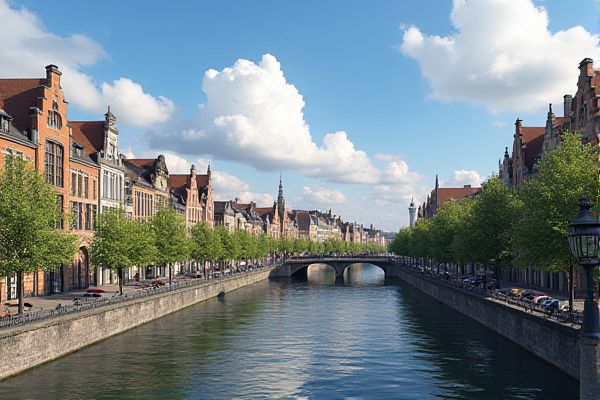
Transportation and commuting in Belgium: Extensive train network. Reliable bus services. Comprehensive tram system. Cycling-friendly infrastructure. Car-sharing options available. E-scooter rentals popular. Multimodal transport apps. Congestion charges in cities. Park-and-ride facilities. Public transport discounts.
Extensive train network
Belgium boasts an extensive and well-connected train network operated by SNCB (Societe Nationale des Chemins de fer Belges) or NMBS (Nationale Maatschappij der Belgische Spoorwegen), connecting major cities and offering both domestic and international routes, including high-speed trains like Thalys, Eurostar, and TGV. With over 3,600 km of rail tracks and numerous train stations across the country, the [train network](https://www.thetrainline.com/trains/belgium) facilitates efficient and convenient travel for both residents and tourists alike.
Reliable bus services
In Belgium, reliable bus services are provided by three main operators: De Lijn, serving the Dutch/Flemish-speaking areas; TEC, operating in the French-speaking regions; and STIB, covering Brussels and the Brabant-Wallon province. These services include comprehensive networks, especially in areas not well-served by the extensive rail system, with buses equipped with standard facilities like air conditioning and access ramps for passengers with reduced mobility. For more information about these networks and connections, visit the Omio website.
Comprehensive tram system
Belgium's comprehensive tram system includes five operational tram networks, with trams run by regional operators such as De Lijn in Flanders, STIB/MIVB in Brussels, and TEC in Wallonia. This efficient transportation solution offers convenient travel options across the country with the ability to use a MoBIB card for seamless payment across different regions. For more detailed information on this topic, you can visit the Transportation In Belgium website.
Cycling-friendly infrastructure
In Belgium, cycling-friendly infrastructure includes high-quality cycle highways built along railways, waterways, and highways, providing smooth and comfortable routes for inter-city cycling. These routes are part of a 2700-kilometer network aimed at encouraging cycling as a regular mode of transport, with ongoing planning, construction, and improvement projects supported by the five Flemish provincial authorities. For more information about these initiatives, you can explore the Cycle Highways project, which highlights the commitment to sustainable transportation.
Car-sharing options available
In Belgium, car-sharing options are available through services like SIXT Share, which partners with MILES to offer car sharing in Brussels, Antwerp, and Ghent. Users can book and manage their car sharing journeys via the SIXT app, with pricing models that include base prices per kilometer, unlock fees, and parking fees.
E-scooter rentals popular
In Belgium, especially in Brussels, e-scooter rentals have become increasingly popular. Services like Avis offer electric scooters as an additional product to car rentals. Additionally, companies like Voi and Lime provide 24/7 access to e-scooters, implementing specific rules and regulations to ensure their safe and orderly use.
Multimodal transport apps
The Floya app, launched by STIB and Brussels Mobility, integrates all modes of transport in Brussels, including trams, metros, buses, e-scooters, bicycles, shared cars, and taxis, allowing users to plan routes and make payments through a single platform. This innovative app promotes multimodality and reduces private car use in the city. Discover more about this groundbreaking initiative at Brussels Times, and learn how Floya is set to revolutionize urban transport and offer a seamless travel experience in the heart of Belgium.
Congestion charges in cities
In Belgium, specifically in Brussels, there are no congestion charges implemented yet, but the city has introduced the Good Move Plan to reduce traffic congestion by closing some streets and creating one-way streets, resulting in a significant reduction in total traffic in the central area. However, the concept of congestion charges is discussed in the context of other cities like London and Stockholm, which have seen significant reductions in traffic and improvements in air quality and travel times through such measures.
Park-and-ride facilities
In Brussels, several new and upgraded Park and Ride facilities are being developed as part of the Good Move plan, aiming to reduce congestion by encouraging commuters to park at the city's borders and switch to public transport. Facilities like Ceria-Coovi, Stalle, Kraainem, and a new large facility in the north offer secured car and bicycle parking and easy access to metro, tram, and bus lines. For more details on these developments, visit the Park and Ride Facilities in Brussels webpage.
Public transport discounts
In Belgium, public transport offers a variety of discounts to make travel more accessible to different age groups. Children under six can travel for free, with a limit of up to four per adult, while those aged six to eleven enjoy half-price tickets. Young adults under 26 also benefit from special rates. Additionally, there are advantageous offers through passes such as the Railpass and the Benelux Pass, which provide various convenient travel options within Belgium, Luxembourg, and the Netherlands. For more detailed information about navigating these discounts and travel options, you can visit the UCLouvain website.
